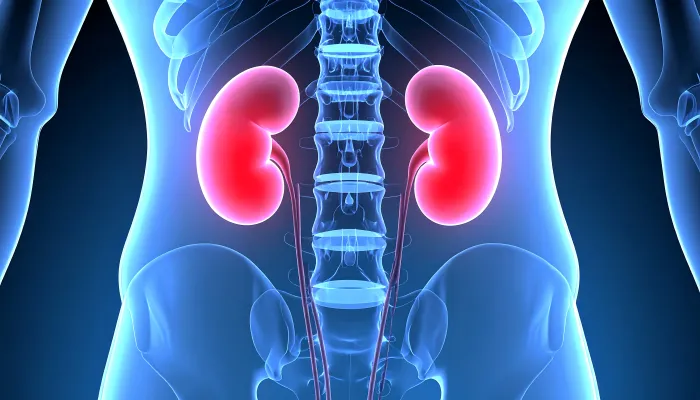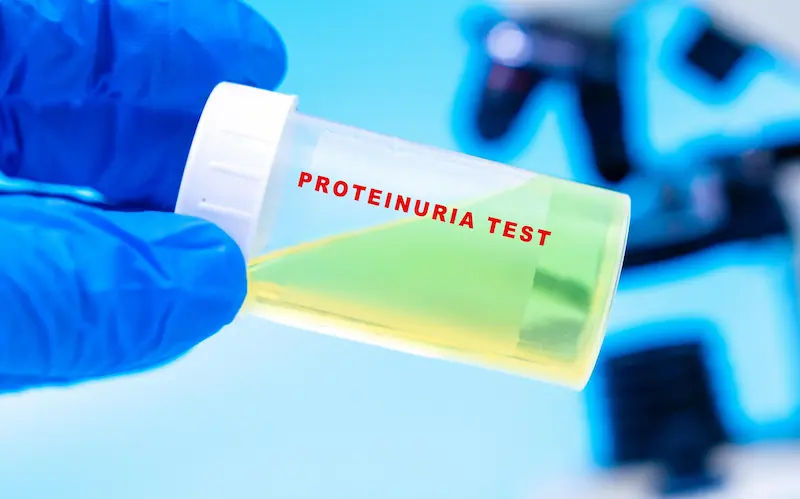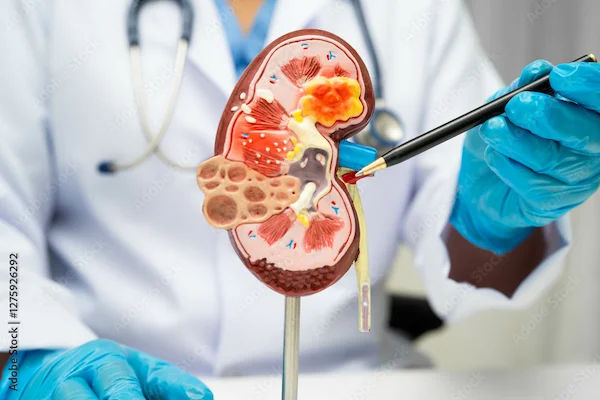Your Ultimate Guide to Protecting Your Kidney Health Naturally
Discover natural ways to protect your kidney health with hydration, nutrition, exercise, and lifestyle strategies. Learn risk factors, prevention tips, and FAQs.

Written by Dr. Dhankecha Mayank Dineshbhai
Reviewed by Dr. Mohammed Kamran MBBS, FIDM
Last updated on 13th Jan, 2026

Introduction
Your kidneys are two of the hardest-working organs in your body, silently performing a life-sustaining filtration job around the clock. Often overlooked until a problem arises, kidney health is fundamental to your overall well-being. Unfortunately, kidney disease is frequently called a "silent killer" because symptoms may not appear until significant, irreversible damage has occurred. The good news is that by understanding how your kidneys work and adopting proactive habits, you can significantly protect these vital organs and reduce your risk of future complications. This comprehensive guide will empower you with knowledge and actionable steps, moving beyond basic advice to provide a holistic plan for lifelong renal wellness. We will explore the critical functions of your kidneys, identify the key risk factors you need to manage, and detail daily strategies—from hydration and nutrition to stress management—that form a powerful defence for your health. Let's dive in and learn how to give your kidneys the care they truly deserve.
Understanding Your Kidneys: The Body's Master Filters
What Do Your Kidneys Actually Do?
Tucked away under your rib cage, these two bean-shaped organs are sophisticated processing plants. Each kidney contains about a million tiny filters called nephrons. Their primary role is to act as your body's waste-removal system. Every day, they process roughly 200 quarts of blood to sift out about 2 quarts of waste products and extra water, which become urine. But their job description is much longer. They also expertly balance your body's levels of salts, minerals (like sodium, potassium, and phosphorus), and acids. Furthermore, they release hormones that regulate blood pressure, produce red blood cells, and activate vitamin D for strong bones. When your renal function is compromised, it can trigger a cascade of health issues throughout your body.
Why Kidney Health is Crucial for Overall Wellness
Think of your kidneys as the body's quality control managers. When they are healthy, they ensure your internal environment is stable and toxin-free. This stability is crucial for nerve function, muscle performance, and maintaining a regular heartbeat. By protecting your kidney health, you are indirectly supporting your cardiovascular system, bone density, and energy levels. Neglecting them can lead to a buildup of waste in the blood, causing symptoms like fatigue, swelling, and shortness of breath, and potentially progressing to chronic kidney disease (CKD) or even kidney failure.
The Silent Threat: Recognising Risks for Kidney Disease
Major Medical Risk Factors (Diabetes, Hypertension)
The two most significant threats to your kidneys are diabetes and high blood pressure (hypertension). Consistently high blood sugar from diabetes can damage the delicate blood vessels in the nephrons, impairing their filtering ability. Similarly, hypertension puts excessive pressure on these vessels, much like high water pressure stresses a garden hose, leading to scarring and weakened function over time. If you have either of these conditions, diligent management is non-negotiable for protecting your kidneys. Regular monitoring with tests like the HbA1c for diabetes is essential. Apollo24|7 offers convenient home collection for tests like HbA1c, making it easier to stay on top of your health.
Health topic carousel:
Doctor's speciality: Nephrology
Text: Consult a Nephrologist for the best advice
Lifestyle and Environmental Risk Factors
Beyond medical conditions, several lifestyle choices elevate your risk. These include:
Smoking: Damages blood vessels, reducing blood flow to the kidneys.
Obesity: Increases the risk of diabetes and hypertension and puts direct strain on the kidneys.
Excessive Alcohol: Can cause sudden changes in kidney function and lead to dehydration.
High-Sodium Diet: Contributes to high blood pressure and kidney stones.
Frequent Use of NSAIDs: Over-the-counter painkillers like ibuprofen and naproxen can cause kidney damage if used regularly over a long period.
Your Daily Defence: Actionable Strategies to Protect Your Kidneys
Hydration: The Cornerstone of Kidney Function
Water is essential for helping your kidneys remove wastes from your blood. Staying well-hydrated ensures that these wastes are diluted and can be passed easily through the nephrons, reducing the risk of crystal formation that leads to kidney stones. The colour of your urine is a great indicator—aim for a pale, straw-like yellow.
How Much Water Do You Really Need?
The old "eight glasses a day" rule is a good starting point, but individual needs vary based on climate, activity level, and overall health. A more personalised approach is to listen to your body and drink when thirsty. Including water-rich foods like cucumbers and watermelon also contributes to your fluid intake. Herbal teas and clear broths are also excellent drinks for kidney health.
The Kidney-Friendly Plate: Nutritional Choices for Optimal Health
What you eat directly impacts how hard your kidneys have to work. A balanced diet rich in whole foods is key.
Foods to Embrace: Antioxidants and Healthy Fats
Focus on a variety of colourful fruits and vegetables (being mindful of potassium if you have existing CKD), such as berries, cabbage, and cauliflower. These are packed with antioxidants that fight inflammation. Include lean proteins like fish and chicken, and healthy fats from sources like olive oil and avocados. These foods good for kidneys provide essential nutrients without overloading them.
Foods to Limit: Sodium, Phosphorus, and Potassium
Processed foods, canned soups, and fast food are typically loaded with sodium, which can elevate blood pressure. For those with advanced kidney issues, monitoring phosphorus (found in sodas and processed meats) and potassium (found in bananas, oranges, potatoes) is crucial, as the kidneys may struggle to balance these minerals. If you need help crafting a diet for chronic kidney disease, consulting a nutritionist or a doctor can provide a tailored plan.
Managing Underlying Conditions: Your First Line of Defence
If you have diabetes or high blood pressure, following your doctor’s treatment plan is the single most important thing you can do for your kidneys. This includes taking prescribed medications, monitoring your levels at home, and attending regular check-ups. If your blood pressure readings remain consistently high despite lifestyle changes, consult a doctor online with Apollo24|7 to adjust your management plan.
Smart Medication Use: Protecting Your Kidneys from Harm
While helpful for occasional pain, nonsteroidal anti-inflammatory drugs (NSAIDs) should not be used daily without consulting a doctor. Long-term use can lead to analgesic nephropathy, a type of kidney damage. Always follow dosage instructions and explore alternative pain management strategies when possible.
The Power of Movement: Exercise and Kidney Health
Regular physical activity helps control blood pressure and blood sugar levels, directly benefiting your kidneys. It also helps maintain a healthy weight, reducing the strain on these vital organs. Aim for at least 150 minutes of moderate-intensity exercise per week, such as brisk walking, cycling, or swimming.
Beyond the Basics: Lesser-Known Tips for Kidney Care
The Importance of Quality Sleep
During sleep, your body enters a repair mode. Research suggests that sleep disturbances can disrupt the hormonal regulation of kidney function and increase the risk of CKD. Aim for 7-9 hours of quality sleep per night to support your body's natural rhythms, including those of your kidneys.
Managing Stress for Renal Well-being
Chronic stress can elevate blood pressure and blood sugar, both of which are detrimental to kidney health. Incorporating stress-reduction techniques like meditation, deep breathing exercises, yoga, or spending time in nature can have a profound positive impact on your overall health, including your renal function.
Conclusion
Protecting your kidney health is a lifelong commitment that pays dividends for your entire body. It’s not about drastic overhauls but about consistent, mindful choices. By prioritising hydration, nourishing your body with kidney-friendly foods, actively managing underlying health conditions, and adopting a healthy lifestyle, you empower your body's natural filtration system to function optimally for years to come. Remember, your kidneys work tirelessly for you; it’s only fair to return the favour. Start by implementing one or two changes from this guide today. If you have specific concerns about your renal function or need help managing a condition like hypertension, don't hesitate to seek professional guidance. If symptoms like persistent swelling, fatigue, or changes in urination concern you, book a physical visit to a doctor with Apollo24|7 for a comprehensive evaluation. Your health is your greatest asset, and your kidneys are central to protecting it.
Frequently Asked Questions (FAQs)
What are the early signs of kidney disease?
Early signs can be subtle but may include fatigue, difficulty concentrating, poor appetite, trouble sleeping, muscle cramping at night, swollen feet or ankles, puffiness around the eyes, and dry, itchy skin. However, many people experience no symptoms initially, which is why regular screening is important.
Are there any natural ways to improve kidney function?
While you cannot reverse significant damage, you can support and improve kidney function naturally by adopting the habits outlined in this article: staying hydrated, eating a balanced diet low in processed foods, maintaining a healthy weight, and controlling blood pressure and sugar. These actions reduce the strain on your kidneys.
What are the best drinks for kidney health?
Water is the absolute best choice. Other good options include unsweetened cranberry juice (in moderation, as it may help prevent UTIs), herbal teas like dandelion root or green tea, and plain lemon water. It's best to avoid sugary sodas and excessive alcohol.
How can I prevent kidney stones?
The most effective strategy is to stay well-hydrated to dilute the substances that form stones. Additionally, reducing sodium intake, limiting animal protein, and eating a diet rich in calcium from foods (not supplements) can help prevent kidney stones.
Should I get my kidneys tested if I have no symptoms?
Yes, especially if you have risk factors like high blood pressure, diabetes, a family history of kidney disease, or are over 60 years old. A simple blood test (for creatinine) and a urine test (for albumin) can effectively screen for kidney problems.
Health topic carousel:
Doctor's speciality: Nephrology
Text: Consult a Nephrologist for the best advice
Consult Top Nephrologists

Dr. Manju Kamal
Nephrologist
12 Years • MBBS,MD(General Medicine), DNB,DM(Nephrology)
Angamaly
Apollo Hospitals Karukutty, Angamaly

Dr. Jayant Kumar Hota
Nephrologist
20 Years • MBBS, MD, DM (Nephro)
Delhi
Apollo Hospitals Indraprastha, Delhi
(75+ Patients)

Dr. Saravana Kumar Karunamoorthy
Nephrologist
2 Years • MD., DM.
Karaikudi
Apollo Hospitals Karaikudi, Karaikudi

Dr. Ch. Anil Kumar
Nephrologist
6 Years • MBBS., MD., DM
Kakinada
Apollo Hospitals Surya Rao Peta, Kakinada

Dr. Aswini Kumar Panigrahi
Nephrologist
23 Years • MBBS, MD (Int. Med.), DNB Nephro
Hyderabad
Apollo Hospitals Jubilee Hills, Hyderabad
(225+ Patients)
Consult Top Nephrologist

Dr. Manju Kamal
Nephrologist
12 Years • MBBS,MD(General Medicine), DNB,DM(Nephrology)
Angamaly
Apollo Hospitals Karukutty, Angamaly

Dr. Jayant Kumar Hota
Nephrologist
20 Years • MBBS, MD, DM (Nephro)
Delhi
Apollo Hospitals Indraprastha, Delhi
(75+ Patients)

Dr. Saravana Kumar Karunamoorthy
Nephrologist
2 Years • MD., DM.
Karaikudi
Apollo Hospitals Karaikudi, Karaikudi

Dr. Ch. Anil Kumar
Nephrologist
6 Years • MBBS., MD., DM
Kakinada
Apollo Hospitals Surya Rao Peta, Kakinada

Dr. Aswini Kumar Panigrahi
Nephrologist
23 Years • MBBS, MD (Int. Med.), DNB Nephro
Hyderabad
Apollo Hospitals Jubilee Hills, Hyderabad
(225+ Patients)
_3.webp)



_4.webp)